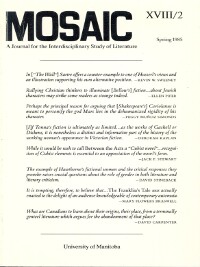Issue 18.2
Overview

General Issue
Published: April 1985
See the issue summary and contents below.
8 essays, totalling 134 pages
$15.00 CAD
The essays in this general issue of Mosaic challenge a number of long-standing interpretations of key literary texts, many by introducing new perspectives with which to reconsider the texts’ theoretical or historical contexts. Jean-Paul Sartre’s “The Wall” is presented as a philosophical argument; the main character of Saul Bellow’s Mr. Sammler’s Planet is reimagined; a mythical substructure in Shakespeare’s Coriolanus is unmasked; and the shift in the leisured classes’ perception of working women is examined in Elizabeth Tonna’s fiction. Other essays in the collection look at the influence of Cubism in Virginia Woolf’s writings, Nathaniel Hawthorne and gender, Chaucer’s knowledge of automata, and Canadian writers’ relationship with their landscapes.
Lying to the Murderer: Sartre's Use of Kant in "The Wall"Kevin W. Sweeney | |
"Two Different Speeches": Mystery and Knowledge in Mr. Sammler's PlanetEllen Pifer | |
Coriolanus and the Myth of Juno and MarsPeggy Mu?oz Simonds | |
The Woman Worker in Charlotte Elizabeth Tonna's FictionDeborah Kaplan | |
Cubist Elements in Between the ActsJack F. Stewart | |
Gender, Hawthorne, and Literary CriticismDavid Stineback | |
The Magic of Machinery: A Context for Chaucer's Franklin's TaleMary Flowers Braswell | |
The Literature of Abandonment in CanadaDavid Carpenter |